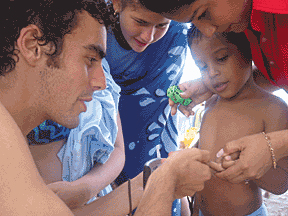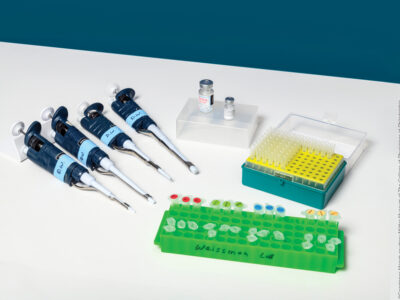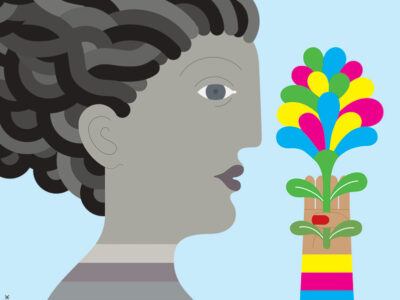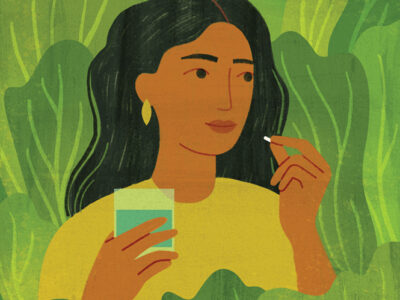
“Camp is a sort of microcosm of life,” Beryl Solomon C’02 is saying. “If you can teach kids, and get them in an intense setting where you’re in charge of them 24 hours a day, you can really shape what they do and think.”
Solomon is not talking about just any camp, nor about shaping the usual thoughts and actions. She’s the special-events coordinator for AYUDA, which stands for American Youth Understanding Diabetes Abroad. The camp in question is Campo Amigo Ecuador, AYUDA’s week-long summer camp in Ecuador for kids with diabetes. In addition to the typical camp activities—sports, games, eating, goofing around—these campers learn about their condition and how to manage it by balancing diet, exercise, and insulin.
AYUDA (www.ayudainc.net) was started eight years ago by Jesse Fuchs-Simon C’02 and his friend Nicolas Cuttriss C’02, who were in Ecuador visiting Fuchs-Simon’s Ecuadorian cousin, José Gabriel. When José Gabriel went into a diabetic coma, his parents were told that as long as they gave him his insulin, he would be fine. Then he went into another coma.
“The moral of the story was that lack of education was just as important as lack of insulin,” says Solomon, who notes that in Ecuador, as in most of Latin America, there is little awareness of diabetes and its treatment. “Jesse and Nick, who were idealistic 16-year-olds, said, ‘How can this be? We’re going to do something about it!’”

After helping José Gabriel obtain a grant to come to the United States and learn how to manage his condition with proper diet and exercise as well as insulin, Fuchs-Simon and Cuttriss started tackling the larger problem. They rounded up as many diabetic kids (and their families) as they could, and formed AYUDA, a nonprofit 501(c)3 whose name also means help in Spanish. They also wrote a workbook about the subject in Spanish; enlisted the Pan American Health Organization in helping them publish it; and got a grant from Youth Venture, which gives seed money to organizations that help young children.
Solomon got involved while on a term-abroad program with Fuchs-Simon in Argentina. “Jesse said, ‘I run this organization called AYUDA,’” she recalls. “I said, ‘That sounds amazing. How can I get involved?’”
And so, in the summer of 2001, she joined Fuchs-Simon and Cuttriss and eight other Penn volunteers, and they set up the camp at a naval training base in the coastal town of Salinas.
“It was mostly friends and people they knew,” she says. “It wasn’t really formal. You had to speak Spanish, but you didn’t need medical training.”
Having been a camp counselor herself for a number of years, she pitched in with “all the programming stuff” —recruiting volunteers, fundraising to pay for the volunteers’ plane fares to Ecuador, and so on. It cost between $500 and $600 to send an Ecuadorian child to camp, and according to Solomon they raised enough money that “not one child paid for camp.”
In addition to starting a one-day “parent camp,” to help educate the kids’ parents, they recently organized a “leadership camp” whose theme is “sustainability.”
“We started to groom a couple of children who are now leaders,” says Solomon. “They started coming to camp when they were 10 or so, and now they’re teenagers. It’s predominantly an opportunity to learn leadership skills so they can really lead the camp. We don’t want to go down and run the camp every year. We were really trying to pass the torch.”
This past February, they organized the first Inter-national Youth Leadership Conference, which was held in Chilca, Peru. “We called it CAI—Campo Amigo Inter-nacional,” she says. “It united youth leaders from 14 different countries to come together and share from each other. We were just the facilitators. It went so well that we were invited to the International Diabetes Federation congress in Paris this past August to be recognized for our work.”
Like Fuchs-Simon and Cuttriss, Solomon is not a diabetic herself.
“It’s raised my consciousness about diabetes,” she acknowledges, “but more than that, it’s made me understand the power that children have. Children living with diabetes are just like other children in the world. They want to play, hang out with their friends, make mischief—it crosses national boundaries. It’s amazing how when people get together, the lines sort of disintegrate.”
—S.H.




